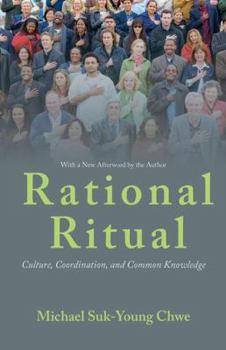Rational Ritual: Culture, Coordination, and Common Knowledge
Select Format
Select Condition 
Book Overview
Why do Internet, financial service, and beer commercials dominate Super Bowl advertising? How do political ceremonies establish authority? Why does repetition characterize anthems and ritual speech? Why were circular forms favored for public festivals during the French Revolution? This book answers these questions using a single concept: common knowledge.
Format:Paperback
Language:English
ISBN:0691158282
ISBN13:9780691158280
Release Date:April 2013
Publisher:Princeton University Press
Length:152 Pages
Weight:0.45 lbs.
Dimensions:0.6" x 5.4" x 8.3"
Customer Reviews
4 ratings
great overview but needs more substance
Published by Thriftbooks.com User , 14 years ago
What purpose do rituals serve? How can people coordinate behavior when many solutions exist? Michael Chwe's book hopes to answer these questions from the perspective of knowledge. He contends that community rituals and education are a means to form common knowledge and initiate individuals into the group. Most interactions are not zero-sum games of conflict: instead, individuals must understand how to coordinate behavior when there are many potential ideal equilibria. Hence, believing that information is the same across individuals can help when attempting to choose amongst multiple equilibria. Chwe offers insight into how these rituals can help separate equilibria, however he falls a bit shy of the mark when he attempts to address counter points to his arguments. Despite this shortcoming, his book offers an interesting overview of the significance of common knowledge and rituals that is short, accessible, and easy to read. Chwe shows that rational behavior motivates individuals to seek common knowledge if they hope to interact in any form of group environment (in which coordination/cooperation is needed). Often in these interactions, individual behavior is conditioned not upon an individual's knowledge, but what that individual perceives others to know. Rituals are one means of generating common knowledge and the specific behavior within the rituals is designed to lay a basic foundation for future interactions. Alternatives to these rituals are costly in that they would require explicit communication on the individual level, or small-group level, but again not everyone could be certain of the knowledge others possess. Chwe uses examples to explain how agents are able to coordinate, showing that many cultural practices are about reinforcing what they already know. Chwe's focus is upon coordination problems in which each person's desire to participate is contingent upon the behavior of others (only wants to participate when others do). He argues that others focus upon different equilibria while the means of coordinating behavior can shed the most light on human behavior. The common solution to coordination problems is some form of ritual, rally or ceremony in which common knowledge necessary for the coordination is generated. Cultural practices coordinate behavior among citizens and create a display in which all are aware that everyone else is participating (and thus legitimizing) the authority. Here, the significance is public attitude and display, not private emotions or ideas of participants: each individual agent could have private thoughts about the illegitimacy of the regime, but unless s/he knows others' thoughts, s/he is likely to continue participating as a loyal constituent (or may try to rebel and create a new group of common knowledge). The framework Chwe creates allows the reader to gain a new understanding of many common features of society quite easily while developing an appreciation for the significance of culture. The first
fascinating but a little disappointing
Published by Thriftbooks.com User , 19 years ago
All of Mike Chwe's papers are on line--including all those included in this book. That's really the only reason that this gets four, rather than five stars. The book (and Chwe's work in general) breaks fascinating ground where economics, with its hyperrationalistic bias, has often refused to tread: the realm of culture, customs, and norms. He argues, convincingly, that these seemingly irrational behaviors often have very rational foundations, specifically due to problems posed by scarce information and inferrence. This isn't necessarily shocking to various subtopics in economics--Condorcet Jury Theorem comes to mind as a classic example, as are recent advances in behavioral finance--but Chwe's approach takes it to far more commonplace varieties of social interactions than, for example, the economics of financial market bubbles and manias.
A new way of thinking
Published by Thriftbooks.com User , 21 years ago
This book has the potential to open the minds of economists to the relationship between culture and economic action, and anthropologists-sociologists and political scientists to the power of game theory. It lays the path towards a new, more intergrated social science, which helps reconcile the collectivist notions of Durkheim with the individualists notions of neo-classical economics, and does this much more effectively - within its realm - than social capitalists like James Coleman and Robert Puttnam. Chwe's ideas are much deeper than theirs - and more better expressed -- he writes very well. Since "Rational Ritual" is more deep than flashy, its real impact will be felt in time.
A theoretical book with popular appeal.
Published by Thriftbooks.com User , 23 years ago
I find this book to be simply compelling. Easy to read and approachable, yet the logic and theories behind the premise are rock solid. What boggles the mind is how incredibly pervasive the concepts are in today's information society. I can see that this book will soon be required reading for advertisement executives, psychologists, sociologists, business school students. This is a powerful look at ourselves and what drives our behavior on a daily basis. Outstanding.






